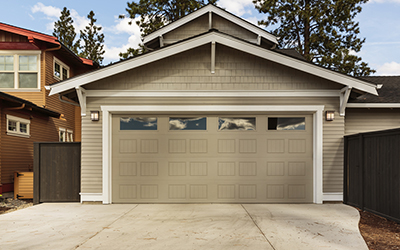 Garage doors are the unsung fifth wall of the home and should be included in your maintenance program, but they’re often overlooked until they stop working. However, like any mechanical system, garage doors don’t last forever. At Simcoe Garage Doors, we receive the question, “How long should a garage door last?” a lot. Here are the main factors that determine the answer: quality, use, care, and environmental conditions.
Garage doors are the unsung fifth wall of the home and should be included in your maintenance program, but they’re often overlooked until they stop working. However, like any mechanical system, garage doors don’t last forever. At Simcoe Garage Doors, we receive the question, “How long should a garage door last?” a lot. Here are the main factors that determine the answer: quality, use, care, and environmental conditions.
Here’s a closer look at what you should know about your garage door’s lifespan and how you can extend its service life.
Average Lifespan of a Garage Door
A properly serviced garage door should last 15 years and potentially up to 30 years if it is properly constructed and maintained. However, other components, such as springs, rollers, and openers, will require replacement much sooner—typically every 7 to 15 years, depending on usage.
Remember that there are many moving parts in the garage door system, and each part has a duration of life expectancy. For example:
- Torsion Springs: 10,000 — 20,000 Cycles (a cycle is one open and close)
- Rollers: 5 to 10 years, depending on type
- Garage Door Openers: 10 to 15 years with routine maintenance
Key Factors That Affect Garage Door Lifespan
Quality of Material and Installation: High-end doors constructed of steel, aluminum, or composite wood are less likely to rust or wear out over time. It is just as crucial as professional installation since improperly installed doors are more likely to have problems and wear out prematurely.
Frequency of Use: If the garage door is also the main entrance to your home, it will wear out more quickly. Repetitive use will also wear out springs, cables, and openers, particularly if they aren’t designed for high cycles.
Climate and Aesthetic Exposure: Homes in areas of extreme weather (heavy snow, humidity, or salty air) may result in earlier garage door part breakdowns. Rust, warping, and swelling often occur in such environments.
Regular Maintenance: Preventive maintenance is one of the most significant contributing factors to longevity. Activities such as oiling moving parts, securing bolts, and inspecting for wear and tear can help add many years of life to your garage door.
Accidents and Damage: Garage doors can be damaged by vehicle dents, misaligned tracks, or damaged panels, shortening a garage door’s life. A timely repair prevents minor problems from becoming major replacements.
Signs It Might Be Time to Replace Your Garage Door
Despite taking care of it, you eventually need to replace your garage door rather than having it repaired continuously. Here are signs to look for:
- They break down all the time Or Make a lot of noise during use
- Apparent bending, breaking, or serious rusting of the tracks
- Sections of the door are sagging, or it won’t open/close properly
- Old or no safety design
- Rising fuel bills caused by inadequate insulation
Ways to Prolong the Life of Your Garage Door
Here are a few tips from Simcoe Garage Doors to keep your garage door in the best shape:
- Schedule professional inspections once a year
- Regularly oil hinges, springs, and rollers
- Scrub and repaint door surfaces to avoid rust and weather damage
- Test the balance and safety sensors once a month
- Pay attention to the small stuff — early repairs prevent big replacements
Final Thoughts
Securing your garage door is an investment in both safety and convenience. When you know how long it should last and what can impact its longevity, you can make informed choices regarding maintenance, repair, or replacement.
If you’re in doubt about the health of your garage door, contact the Simcoe Garage Doors team. We provide fair estimates, professional repairs, and replacements, and we have thousands of new garage doors in stock to fit any budget.
